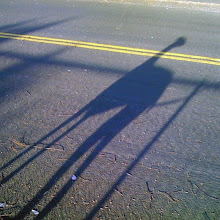Of Course We Like Singin' in the Rain, Don't Everybody?
It is irresistible, of course, Kelly's mad play about the drenched soundstage (why was anyone ever that impressed the film could be re-created on stage back in the '80s or whenever that was?), and the wonderful Brown and Freed tune, and the swooping crane work that moves in and out on Kelly like a dance partner. His "yada-yada-yas" are almost too effusive, but he's supposed to be crazy in love, not to mention he just figured out how to save what seemed like a doomed career (a good night, all in all). Those stomps in the puddles are so free--it makes dancing seem so much more possible for the non-Kellys among us. Of course, throughout the number Kelly is musically attuned--there's actually very little freedom in the sequence, for he must go delicate with the music, or swing wild with the swells. It ends, of course, when the policeman comes along--the old super ego wondering what all this extravagant fuss is about--enough to guilt Kelly to a stop, to give his now pointless umbrella to a passerby.
It does mean something that the greatest sequence of the film is Kelly solo. That sums up Kelly for me--no one can love him as much as himself, so why bother to partner? Sure enough, the number in a number in a number number "Broadway Rhythm Ballet," which I still think of as "Gotta Dance," features a dream vision of a dancer (not Kathy Selden or Lina Lamont) but Cyd Charisse, owner of Hollywood's best ever-legs. When Charisse and Kelly actually do "ballet" she's got that silly white train on that eventually shoots straight up. That's the pay-off for Don Lockwood's dancing wet dream.
And then there's poor Lina. Jean Hagen's honk of a voice and impeccable timing as this helplessly untalented star allow her to steal every scene she's in, which isn't easy co-starring alongside muggers like Kelly and Donald O'Connor (btw, a paean to "Make Em Laugh" will have to wait for another bloglet). Sure, she's gets truly mean at the end, hoping to keep Kathy hidden away as her voice forever.
But doesn't she deserve better? If she ends up a Marie Provost (as Nick Lowe had it "when the talkies came, Marie just couldn't cope...she was the winner, that became the doggie's dinner..."), how will we all feel then? She really is an innocent victim of two forces that have run roughshod over many in the 20th century--publicity and technology. She read and believed all those stories that she and Don were a hot star couple. She could act for the silents, but then she had to be able to speak on her own. Perhaps we need more mercy for the less than mellifluous, the too-quick-to-believe.


0 Comments:
Post a Comment
<< Home